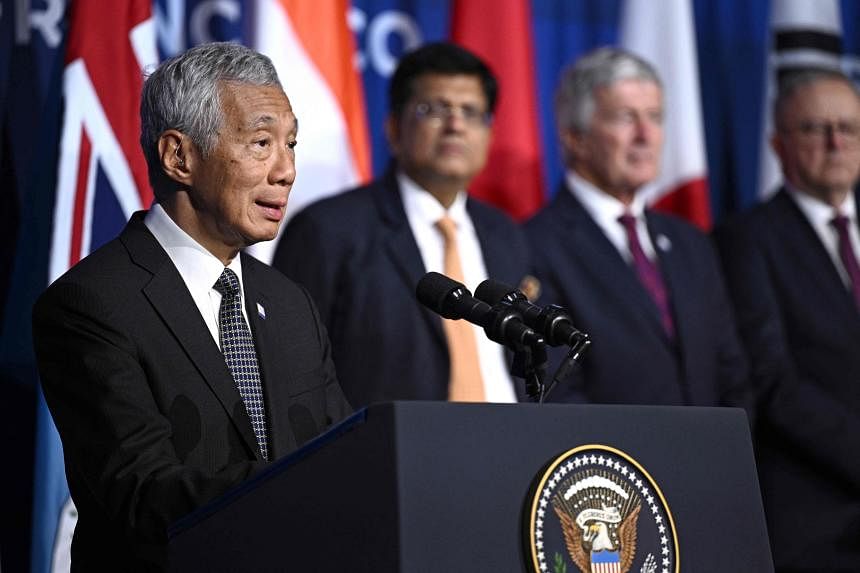
SAN FRANCISCO – Trade is critical but trade policy is tough, Singapore Prime Minister Lee Hsien Loong said after United States President Joe Biden’s signature economic initiative in the Asia-Pacific hit a roadblock on trade.
“Trade is the lifeblood of the global economy. And the trade pillar is an integral part of the IPEF agreement and of the US’ economic and strategic engagement in the region,” PM Lee said at a meeting here of 14 nations that are part of the Indo-Pacific Economic Framework for Prosperity (IPEF).
“But developing new and creative approaches to trade policy is not easy, and it takes time in order to carefully work through sensitive areas, and to choose the best moment to commit to the deal,” he added.
Announced by Mr Biden in May 2022, IPEF is the centrepiece of US economic engagement in a region where most nations count China as their top trading partner. It consists of four pillars: trade, supply chain, clean energy, and anti-corruption.
Meeting on the sidelines of the annual Asia-Pacific Economic Cooperation (Apec) leaders’ meeting on Thursday, IPEF leaders announced progress on three of the four pillars.
They signed a landmark agreement to prevent supply chain disruptions, and also announced they had substantially concluded agreements on clean energy and anti-corruption measures.
But the trade pillar – of key importance to the export-driven Asian economies – hit a snag when congressmen from Mr Biden’s own Democratic Party, including influential Ohio Senator Sherrod Brown opposed the deal, fearing the political consequences that could impact on the 2024 election cycle.
In his speech, PM Lee anticipated more progress in meetings to be held in 2024.
“We look forward to further progress in the negotiations as well as in tangible cooperation next year,” he said, adding that Singapore welcomed the innovative agreements on supply chain resilience, clean economy and the fair economy.
“These will enhance the trade and investment environments in our economies for businesses, for workers, and for other stakeholders,” he said, adding that Singapore will host the inaugural IPEF Clean Economy Investor Forum in the first half of 2024.
The forum will help match capital to projects to advance decarbonisation and the transition to zero-emission economies.
Mr Lee also said the IPEF should continue to be open, inclusive and flexible, including towards new members. The grouping includes India, a non-Apec member, but excludes China.
Speaking to reporters, US Commerce Secretary Gina Raimondo noted the “tons of enthusiasm” from IPEF partners. It is “solving problems in supply chains, in infrastructure, in climate that are highly relevant to our partners”, she said.
Mr Joseph Liow, the Tan Kah Kee Chair in Comparative and International Politics at Nanyang Technological University (NTU), said the lack of agreement on trade was a setback, even if US partners were not particularly shocked.
“It just reinforces the concern again of how the external engagement agenda can be hijacked by domestic politics,” said Mr Liow.
“Having said that, after all that has gone on in the US the last few years, and its decided turn from active leadership in global trade, I don’t think it was particularly shocking for many regional states.”
Veteran US trade negotiator Wendy Cutler said the path ahead remained uncertain.
“November was always an ambitious target for the trade work,” she told The Straits Times, pointing out that such deals take many years to forge.
“It was deeply unfortunate that the IPEF trade pillar did not produce deliverables this week in line with announcements made in the Commerce-led pillars,” said Ms Cutler, who is the vice-president of the Asia Society Policy Institute.
“While our trading partners were clearly disappointed, and for some, memories of the US TPP exit came to mind, they seemed to bounce back and accept the situation,” she said in a reference to the Trump administration’s decision in 2017 to pull out of the Trans-Pacific Partnership, billed as the world’s largest trade deal.
Ms Cutler said it is an “open question” how committed IPEF members will be to work with US negotiators during the 2024 presidential election year.
“That’s a lot to ask, given our domestic politics on trade for both Democrats and Republicans.”
Mr Charles Freeman, senior vice president for Asia at the US Chamber of Commerce, did not mince his words. “The level of nervousness about the domestic constituencies that have aligned against trade has handicapped the administration from achieving any level of effectiveness in what should be a leg of a genuine US Indo-Pacific strategy,” he said.
https://news.google.com/rss/articles/CBMiZmh0dHBzOi8vd3d3LnN0cmFpdHN0aW1lcy5jb20vd29ybGQvdHJhZGUtZGVhbHMtYXJlLW5vLWNha2V3YWxrLXNheXMtcG0tbGVlLWFzLWlwZWYtc25hZ3Mtb24ta2V5LXBpbGxhctIBAA?oc=5
2023-11-17 06:05:00Z
2555257220
Tidak ada komentar:
Posting Komentar